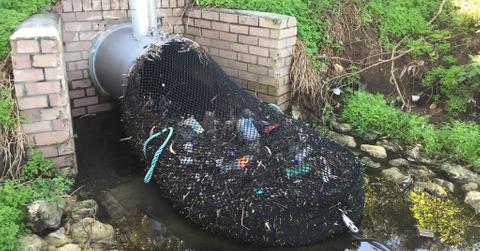People Think This Water Pollution Filter Is So Brilliant, It Should Be Everywhere
An Australian city recently installed drainage nets in its water reserve, and the innovative filtration system has gone viral for being so simple yet brilliant.
Updated Feb. 12 2019, 2:28 p.m. ET

Just imagine... It's a sunny summer day, and you're reclining on the grass by your local lake. The sun is glistening on the water. Ducks are happily gliding along with their duck pals. A cool breeze blows towards you, just as you were feeling a bit warm. Garbage is floating on the surface of the water, slowly poisoning fish and breaking down into micro plastics... Ah, what a classic 2019 image. These days, it's hard to enjoy a serene body of water without coming across some sort of plastic pollution — and an Australian city has developed a local solution to that. The City of Kwinana recently installed drainage nets in its water reserve, and the innovative filtration system has gone viral for being so simple yet brilliant.
The City of Kwinana, which is a suburb of Perth, Australia, first shared a photo of one of its nets on Facebook in August. People quickly flooded the comments section to praise the invention, and six months later, the post is still being shared all over the internet. Once it started going viral, the city opened up about the system in a detailed blog post on the municipality's website. There, Carol Adams, the mayor of the City of Kwinana, elaborated on exactly how the nets work.
"The nets are placed on the outlet of two drainage pipes, which are located between residential areas and natural areas. This allows the nets to capture the gross pollutants carried by storm water from the local road network before those pollutants are discharged and contaminate the natural environment at the downstream end of the outlet area," Mayor Adams explained in a statement shared in the blog post. "This ensures that the habitat of the local wildlife is protected and minimizes the risk of wildlife being caught in the nets. To date no wildlife has been caught up in either of the City's nets."
The simple WA waste solution that's gone global.The simple WA waste solution that's gone global.
Posted by Today Tonight on Wednesday, 15 August 2018
Once nets fill up, city employees use a machine to lift them up and empty them into a truck. And no, it's not just a garbage truck headed for landfill. The truck actually brings the debris to a sorting facility, where compostable waste (like food scraps and leaves) and recyclable items are sorted and properly composted or recycled before the remaining waste is sent to landfill. As The Guardian explained, landfills do not provide the proper conditions for biodegradable waste to break down, so it's wonderful that Kwinana is going the extra mile and properly disposing of each item the nets capture.
From the time the two nets were installed at the Henley Reserve in March 2018, up until the post was written in August 2018, the nets filtered 370 kilograms (which is about 815 pounds) of waste from entering the city's water reserves, Adams said. And the City of Kwinana has no plans to quit while they're ahead. According to another post on the city's website, has their eyes on three other spots along the Henley Reserve that they are going to propose outfitting with similar nets as part of the city's 2019/2020 budget.
The idea looks pretty simple — but more work went into the nets than it seems. The City of Kwinana said that from start to finish, the two nets cost a little under $20,000. However, that fee is far less than what would have been required to hire a maintenance team to manually remove litter from the reserve. All of the work and finances invested so far are "expected to realise considerable cost savings in labour intensive work previously required to collect the rubbish scattered around the reserve by hand," according to Kwinana's blog post.
A representative for the City of Kwiwana's Facebook page spoke with Green Matters via Facebook about the innovation, and the unexpectedly large amounts of debris they consistently catch. "In terms of cost efficiency, they are not as cost efficient as initially thought due to the high volume of material they trap, with some being organic matter including leaves," the spokesperson told Green Matters. "This requires additional maintenance work to remove the trapped material which adds to the cost."
Kwinana's original Facebook post is full of comments about how genius and innovative the drainage nets are — but Kwinana is not the first to implement a drainage system like this. The Twitter account for Nelson, New Zealand tweeted that its council has been using a similar structure for a decade.
Kwinana's post going viral shows how powerful social media can be when it comes to implementing environmental change. As the City of Kwiwana representative told Green Matters via Facebook, the post about the nets has been "a great success in raising community awareness across the globe in regards to protection of nature reserves and waterways from pollutants conveyed by storm water drainage systems." The spokesperson also said that now, almost 10 months after the nets were originally installed, people are still contacting the city with questions about the nets. Hopefully Kwinana will inspire other municipalities to invest in drainage nets in the near future.